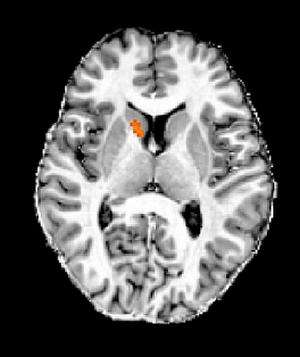Game of Japanese chess reveals how experts develop their capacity for rapid problem-solving

(Medical Xpress)—The superior capability of experts to rapidly solve problems depends largely on their intuition, and it has long been known that this is related to experience and training. Although many psychological models relating to the development of intuition have been proposed to explain this phenomenon, none have been validated, and the underlying neural mechanisms remain a mystery.
Keiji Tanaka and colleagues from the Cognitive Brain Mapping Laboratory and Support Unit for Functional Magnetic Resonance Imaging at the RIKEN Brain Science Institute have now shown that activity in the basal ganglia of the brain, which is related to the automatic, rapid information processing or intuition characteristic of experts, develops during the course of training. The work provides a first insight into the neural response of the brain to extended training and hints at ways to improve the efficiency of training experts in industry.
In earlier work, another research team led by Tanaka showed that amateur players of the Japanese chess-like game of shogi plotted their best next-moves consciously using the human brain's highly developed cerebral cortex. In contrast, they found that in professional players an important part of this process was unconscious or intuitive and had shifted to the head of the caudate nucleus in the basal ganglia, a much older part of the brain. This would leave the cortex free for higher-level strategy, the researchers suggested. Yet it remained unclear as to whether this shift of neural activity was entirely due to training, or dependent to some extent on pre-existing ability.
Tanaka's most recent experiments involved training 20 novices for 15 weeks in mini-shogi, a simplified version of shogi. After about two weeks and again at the end of the 15-week program, the intuition of the volunteers was tested through their ability to come up with the best next-move to end-phase patterns of mini-shogi games. To ensure the answers were intuitive, each problem was presented for just two seconds and participants had to respond within three seconds. During this process, brain activity was recorded using functional magnetic resonance imaging (fMRI). The researchers found that activity in the caudate nucleus developed over the training period, whereas activity in the cortex remained unchanged.
"This work should open a fruitful interaction between the cognitive psychology of expertise development and biological studies of the basal ganglia," says Tanaka. "We now would like to elucidate what computations the caudate nucleus conducts in generating the best next-move."
More information: Wan, X., et al. Developing intuition: Neural correlates of cognitive-skill learning in caudate nucleus. The Journal of Neuroscience 32, 17492–17501 (2012). dx.doi.org/10.1523/JNEUROSCI.2312-12.2012


















